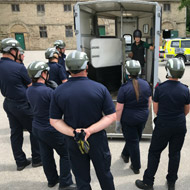
Culture changed welcomed by animal rescue officers
Students and young vets are leading the way in promoting the importance of wearing helmets around large animals.
The culture change has been welcomed by the British Animal Rescue and Trauma Care Association (BARTA), which promotes the importance of wearing personal protective equipment (PPE).
BARTA director Josh Slater said: “The time is right for the equine vet profession to fully engage with helmet use. Our vet schools all have helmet policies, some mandatory (i.e. wear helmets at all times when working around animals) and others are risk-based, but each year of new graduates from 2018 onward will be used to wearing helmets.
“The really pleasing thing is that students seem to be embracing helmets and we certainly don’t see any signs of reluctance to wear helmets. Therefore the general approach is a ‘bottom-up’ culture change project with students and young vets leading the way.”
BARTA runs a vet awareness and educational programme for new and practising vets. It is aimed at those who need to work with emergency responders when dealing with incidents involving animals.
At a minimum, the organisation recommends that the minimum level of PPE should include a helmet, high-vis jacket and protective footwear.
BARTA’s director of rescue Jim Green said: “Consideration for PPE is an important aspect of any working environment and must be based on sound understanding of hazards and the risk of harm. The Health and Safety at Work Act places responsibility on employers to assess hazards and determine risks to their employees, equipping them with training and PPE to mitigate risk, having made every effort to reduce the likelihood of harm occurring.
“The emergency services are used to operating in unpredictable circumstances and have a very robust approach to wearing PPE which is also very culturally accepted and practised. Some veterinarians have clear policies for certain environments, however, it is noticeable that they accept risk more readily when dealing with large animals in the field and this is reflected in the number of injuries sustained.”
Image (C) BARTA



 The Veterinary Medicines Directorate (VMD) is inviting applications from veterinary students to attend a one-week extramural studies (EMS) placement in July 2026.
The Veterinary Medicines Directorate (VMD) is inviting applications from veterinary students to attend a one-week extramural studies (EMS) placement in July 2026.